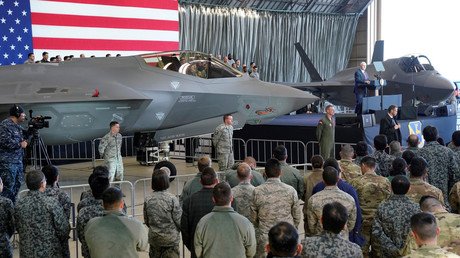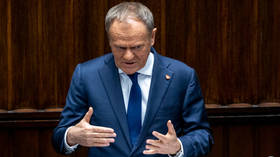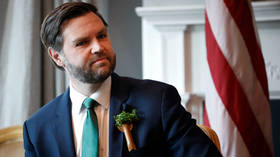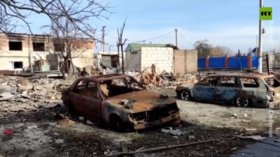Trump says he 'thinks' he can pull out of NATO without congressional approval
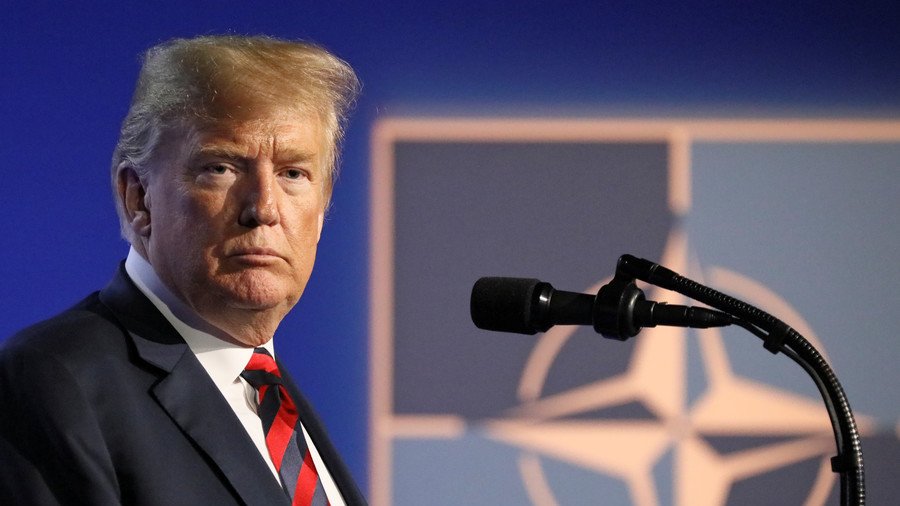
Speaking with journalists at the NATO summit in Brussels, Donald Trump said he "thinks" he can pull out of NATO without congressional approval.
The US president made the statement when asked if he had threatened to pull out of the alliance, and whether he thought he could do so without first consulting Congress. Trump ignored the first question, but on the second question, he said, “I think I can.”
According to Politico, Trump warned his allies behind closed doors that they would need to radically increase defense spending or the US “will do our own thing.” NATO Secretary-General Jens Stoltenberg then reportedly shifted the meeting to an allies-only emergency session, requiring European Commission President Jean-Claude Juncker to leave the room.
After the emergency session, Trump said that the alliance is “very unified, very strong, no problem.” He added that NATO allies had committed to increasing their defense spending to beyond two percent of GDP, and added that pulling out of the military alliance would therefore be “unnecessary.”
However, French President Emmanuel Macron denied Trump’s claim that all 29 member states pledged to increase spending beyond the two percent goal, and added that "President Trump never at any moment, either in public or in private, threatened to withdraw from NATO."
At present, only five NATO member states – the US, UK, Greece, Estonia, and Poland – allocate two percent of their GDP to defense spending, a requirement for membership. In 2017, the US spent $686 billion on defense, over double the expenditure of all 28 other states combined.
The discrepancy in funding has been a constant source of chagrin for Trump, who has accused the other member states of not pulling their weight. In the run-up to this year’s summit, the president singled out Germany, which spends only 1.2 percent of its GDP on defense.
Voicing his frustrations via Twitter on Thursday morning, Trump said that previous US presidents have been lobbying Germany to increase defense expenditure for years, as the US continues to foot the bill for defense against a perceived Russian threat.
Presidents have been trying unsuccessfully for years to get Germany and other rich NATO Nations to pay more toward their protection from Russia. They pay only a fraction of their cost. The U.S. pays tens of Billions of Dollars too much to subsidize Europe, and loses Big on Trade!
— Donald J. Trump (@realDonaldTrump) July 12, 2018
....On top of it all, Germany just started paying Russia, the country they want protection from, Billions of Dollars for their Energy needs coming out of a new pipeline from Russia. Not acceptable! All NATO Nations must meet their 2% commitment, and that must ultimately go to 4%!
— Donald J. Trump (@realDonaldTrump) July 12, 2018
“On top of it all,” he tweeted, “Germany just started paying Russia, the country they want protection from, Billions of Dollars for their Energy needs coming out of a new pipeline from Russia. Not acceptable!” Trump had savaged Germany for its commitment to the Nord Stream 2 pipeline on Wednesday, which would increase the amount of natural gas flowing between Russia and Germany, and in Trump’s view, increase European dependence on Russia.
Trump has a history of threatening allies he sees as taking advantage of US protection. Before last year’s Brussels summit he made similar threats, with a White House official saying “He is not going to stay in NATO if NATO doesn’t make a lot more progress much quicker.”
Full quote from senior White House official on Trump threat to leave #NATO right here: pic.twitter.com/RTbOq2vg1w
— Philip Crowther (@PhilipinDC) May 17, 2017
Immediately after taking office in January of that year, Trump declared the alliance “obsolete,” and said it had failed to properly “take care of terror.” He later backtracked, and praised the alliance as the “bulwark of international peace and security” that “defeated communism and liberated the captive nations” of Eastern Europe.
On Thursday, Trump demanded that NATO allies eventually crank up defense spending to four percent of GDP, a figure that the US itself has yet to meet.
Think your friends would be interested? Share this story!
